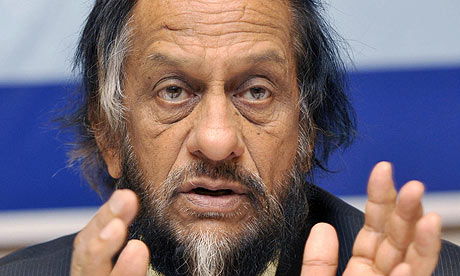- London Guardian -
Rajendra Pachauri says there is 'virtually no possibility' of a few scientists biasing IPCC's advice, after UAE hacking breach
Read part one of our Pachauri interview: 'Our lifestyles are unsustainable'

Rajendra Pachauri: batshit crazy.
There is "virtually no possibility" of a few scientists biasing the advice given to governments by the UN's top global warming body, its chair said today.
Rajendra Pachauri defended the Intergovernmental Panel on Climate Change (IPCC) in the wake of apparent suggestions in emails between climate scientists at the University of East Anglia that they had prevented work they did not agree with from being included in the panel's fourth assessment report, which was published in 2007.
The emails were made public this month after a hacker illegally obtained them from servers at the university.
Pachauri said the large number of contributors and rigorous peer review mechanism adopted by the IPCC meant that any bias would be rapidly uncovered.
"The processes in the IPCC are so robust, so inclusive, that even if an author or two has a particular bias it is completely unlikely that bias will find its way into the IPCC report," he said.
"Every single comment that an expert reviewer provides has to be answered either by acceptance of the comment, or if it is not accepted, the reasons have to be clearly specified. So I think it is a very transparent, a very comprehensive process which insures that even if someone wants to leave out a piece of peer reviewed literature there is virtually no possibility of that happening."
The IPCC, which was set up by the UN in 1988, is the world's leading authority on climate change. It advises governments on the science behind the problem and was awarded the Nobel peace prize along with Al Gore in 2007.
Pachauri was responding to one email from 2004 in which Professor Phil Jones, the head of the climatic research unit at UEA, said of two papers he regarded as flawed: "I can't see either … being in the next Intergovernmental Panel on Climate Change report. Kevin [Trenberth] and I will keep them out somehow – even if we have to redefine what the peer-review literature is!"
Pachauri said it was not clear whether the wording of the emails reflected the scientists' intended actions, but said: "I really think people should be discreet … in this day and age anything you write, even privately, could become public and to put anything down in writing is, to say the least, indiscreet … It is another matter to talk about this to your friends on the telephone or person to person but to put it down in writing was indiscreet. If someone was to say something like this in an IPCC authors' meeting then there are others who would chew him up."
Jones has denied any suggestion that he tried to suppress scientific evidence he disagreed with or that he manipulated data.
Some commentators, including the former chancellor Nigel Lawson and the environmental campaigner and Guardian writer George Monbiot, have called on Jones to resign but Pachauri said he did not agree. He said an independent inquiry into the emails would achieve little, but there should be a criminal investigation into how the emails came to light.
Pachauri said he doubted that trust in the IPCC would be damaged by the affair. "People who are aware of how the IPCC functions and are appreciative of the credibility that the IPCC has attained will probably not be swayed by an incident of this kind," he said.
He pointed out that five days after the emails were made public, Barack Obama announced a major commitment to cutting greenhouse gas emissions ahead of the UN climate summit in Copenhagen.
No comments:
Post a Comment